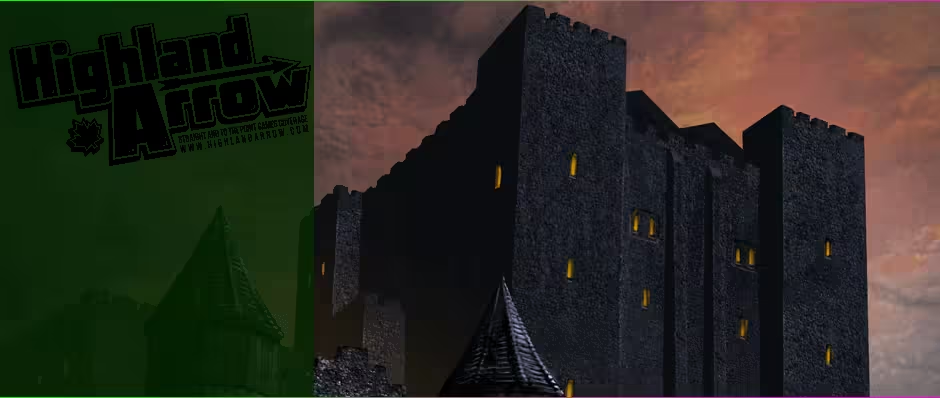


Baldur's Gate
Platforms: PC, Linux, Mac
Reviewed on: PC
Reviewer: Trever Bierschbach
Developer: Black Isle Studios / Beamdog Games
Publisher: Beamdog Games
Released: 1998-12-21 / 2013-01-16
Review Published: 2018-12-26
Review Updated: 2020-04-06
+ Interesting and compelling story
+ Lengthy gameplay
+ Beautiful scenery and areas to explore
+ Great lead-in to a much larger series
- Some grinding required
- Smaller graphical elements don't hold up
- Some side-quests feel like pointless filler

Baldur's Gate is an isometric role-playing game developed by Black Isle and recently remastered by Beamdog Games. If you aren't familiar with Baldur's Gate, here's a little history. The game was released in 1998 and achieved stellar success, well above expectations, over the course of 5 years. The developer's goal of 200,000 sales was surpassed easily in 1999, and by 2003 2.2 million copies had been sold. The game is set in a fantasy Dungeons and Dragons world called the Forgotten Realms and is credited with not only saving D&D video games, but also CRPGs in general. It was named game of the year in '99 and to this day remains a regular on just about any "Best of" list for video games.
The game was unique in its design, from the multiple story paths to the Bioware Infinity Engine that was developed along with the game. Art design was also unique at the time, as each area was individually rendered rather than created from tiles as games had been in the past. The game launched a craze for D&D based RPGs which gave us an entire series including, Baldur's Gate II, Icewind Dale and its sequel, Planescape: Torment, and both Neverwinter Nights games. I'm confident in stating that without Baldur's Gate, and the games that followed, RPGs today would look very different.
Standing the Test of Time
In 1998 Baldur's Gate was ahead of its time from a design perspective. The characters themselves not so much though. Even in the close-up rendering of the characters in the inventory panel there's much to be desired. You can kind of tell who is who, once you get them decked out in armor, but there's very little going on in that department. It's the world, set pieces, maps, and magic where this game shines graphically. A great deal of talent went into making the environment rich and detailed. Colorful glades, dense forests, and rocky mountain trails are all beautiful to explore. The towns and cities are detailed and full of life. Even today, with our high-end graphics, Baldur's Gate remains a fun world to explore. The developers also did a spectacular job with the magic of the world compared to games of the time. I remember when magic in games was just a twinkling of lights and a strange sound effect. In Baldur's Gate each spell seems to have been designed with its own visual and audible effect, and they are fantastic.
The music and sound design in the game is also an area where it still holds up. There is some rumor that Michael Hoenig copied the theme of the movie Lifeforce in one of the tracks, but nothing that was acted upon. Magical effects also get special attention in the sound design. Voiced incantations and blasts of sound mark the casting of spells, with most having their own effect.
At this point the game is pretty solid when it comes to the core material. I didn't run into any bugs or crashes with the extended edition by Beamdog. It doesn't look like they added as much to the first game as they did to the second, which may be why it wasn't as noticeable. The NPCs that were added were decent, as were some of the fixes. I'll admit that I didn't notice many of the chances as it's been decades since I played it the first time. Overall the quality of the game is still good and holds up pretty well today.
Rolling the Dice
The mechanics of Baldur's Gate mixes the rules of Advanced Dungeons and Dragons with that of a hybrid of real-time and turn-based RPGs. Unlike previous D&D games from developers like SSI, combat in Baldur's Gate could be planned, paused, and managed like a turn-based game. In fact, some areas of the game become incredibly difficult if the player doesn't use the pause button to queue attacks and spells or stop combat so a healer could be redirected in time to save one of the party members. In the background attacks, spells, damage, and skills are all handled through a random number generator that was built around the core rules of D&D so there's very little hand-eye coordination involved like you'll find with more modern RPGs.
Gameplay itself is pretty straight forward, and even easier if you are familiar with Dungeons and Dragons. Even if you're not the basics are quick to master. You create a character who will be the main protagonist and leader of your party, give them a class and build them much like you would for the tabletop game. Your party can consist of 5 other characters that you choose along the way. You can control each character during combat or give them a pre-programmed AI from a list of available options and let the computer manage them. In most cases, especially when combat becomes challenging, you'll be using the pause function to queue up commands and make sure they're doing exactly what you want. The AI isn't terrible, but there are times when you need a healing spell a little more promptly than the AI provides, or you'd rather focus them on different targets than they choose themselves.
Conversation and sort of role-play is also a major factor of gameplay here. Baldur's Gate is one of the first RPGs to give more dynamic conversation options, and the ability to role-play your character. A variety of responses to conversation is available, from the altruistic hero to the malicious villain. Not only do you have multiple options when it comes to the conversation trees, but your choices have an impact on your character, and the story. The game uses the same alignment system that D&D has, which identifies your character's social and moral outlooks on the world. You may build a character that is Lawful Good, the strict good guy who adheres to a set of codes or standards for life, but your conversation choices can change that. My own paladin, a knight in shining armor type, lost many of his abilities because of too many poor choices and an alignment shift. You can lose the help of other party members as well, if your choices take you too far away from their moral compass. That also happened a couple of times during my play through.
One of the problems I did have with the gameplay is the grind. Some RPGs do a good job of making sure the story and quests carry you through the game without a lot of grinding for levels and gear. Some don't. Baldur's gate falls somewhere in the middle. Most of the time I was exactly the level I needed to be to complete whatever part of the story I was in. Sometimes, however, I'd find myself outmatched and have to go back to random areas and fight monsters for a couple of hours to build up enough experience to gain a level. I've seen worse, but it's something I could have done without in the game.
Sins of the Father
Baldur's Gate uses a relatively common plot device and encapsulates it in the world and lore of the Forgotten Realms campaign world. You play a character who is the child of Bhaal, an evil God also known as the Lord of Murder. Bhaal procreated with quite a few mortals during a period of Faerun's history called the Time of Troubles. The course of the story takes you through fixing local troubles and solving mysteries in the Sword Coast. The overarching story, however, deals with whether you will follow in your father's footsteps or become a hero in spite of him.
For the most part the story, and the sub-plots that connect it all together, are interesting and engaging. You are offered several paths in regards to how heroic or evil you want to be as you progress through it. You'll travel the Sword Coast between the city of Baldur's Gate, and the northern border of the country of Amn as you help local towns and settlements with various troubles. Some are connected to the main story as you find out that an organization called the Iron Throne is behind many of the area's troubles. This revelation will eventually lead you to Baldur's Gate and uncovering the scheme to overthrow the city's leaders and start a war with Amn. Some of the small side plots just seem like pointless filler, but thankfully not that many. Eventually you are pitted against another Bhaalspawn named Sarevok, whose defeat saves the region. The story mixes action, adventure, and intrigue with a pacing that keeps you interested and wanting to see what happens next. I found it had a good balance of dialogue and description. The balance between action and story was good as well. A lot of games try so hard to pack in a story that they forget that video games are meant to be interactive, and RPGs themselves need action as well as a good plot. Baldur's Gate manages to deliver a great balance for such a lengthy game.

